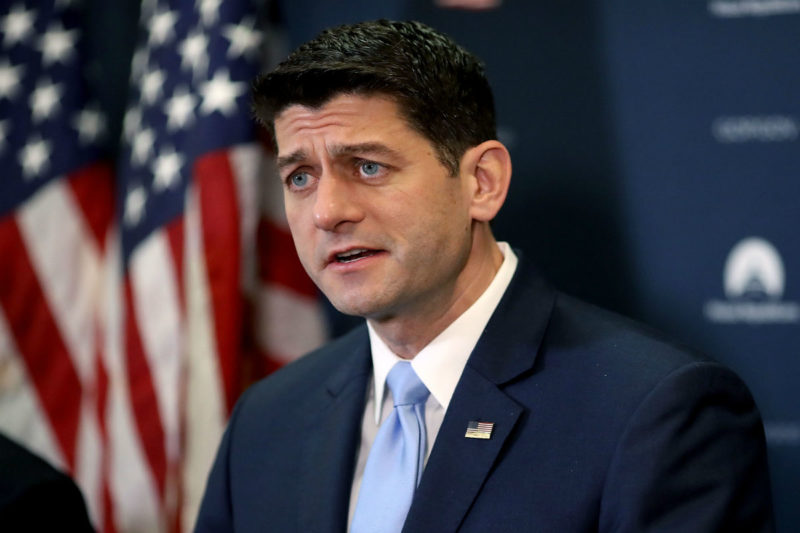Paul Ryan’s State of the Union Guest No Stranger to Conservative Litigators and the White House
By inviting one abortion-rights foe, Ryan underscored the close working relationship between congressional Republicans, the Trump administration, and the Alliance Defending Freedom, an anti-choice and anti-LGBTQ group.

When House Speaker Paul Ryan (R-WI) announced that he would bring Cathy Cenzon-DeCarlo, “a fighter for faith and the unborn,” to the State of the Union this year, he underscored, intentionally or not, the close working relationship between congressional Republicans, the Trump administration, and the Alliance Defending Freedom (ADF), a conservative litigation mill that goes to bat for anti-LGBTQ causes and attacks on reproductive rights.
Cenzon-DeCarlo, a nurse, was the plaintiff in an ADF case against Mt. Sinai Hospital’s “forced abortion-participation policy,” according to a 2013 press release from the legal organization. Congressional Republicans have long trotted out health providers—including, on multiple occasions, Cenzon-DeCarlo—who claim their workplaces pressured them to participate in abortion care or retaliated against them for refusing to do so. The complaints give the appearance of a widespread problem that doesn’t exist to the degree that it’s portrayed. In fact, both federal and state laws already provide a comprehensive network of so-called conscience protections, or legal shields from otherwise refusing care, for employees like Cenzon-DeCarlo.
Their stories are fodder for congressional Republicans, President Trump’s political hires, and ADF lawyers, separately and together, to make the case for these protections in the name of “religious freedom,” or religious imposition. Conscience protections often elevate invariably conservative Christian beliefs over the medical needs of vulnerable patients. Historically, this dynamic has left patients seeking comprehensive reproductive health care, as well as transgender patients, vulnerable to substandard medical care or to being turned away altogether.
Former ADF Senior Legal Counsel Matt Bowman worked on Cenzon-DeCarlo’s case, per the aforementioned press release. At ADF, Bowman represented secular for-profit businesses challenging the birth control benefit in the Affordable Care Act. He also worked on cases for anti-choice “crisis pregnancy centers,” fake clinics that claim to provide reproductive health-care services but often lie to patients in hopes of persuading them against having an abortion. Bowman and company sought to circumvent state laws, like California’s law requiring the fake clinics to provide information about the availability of birth control and abortion services—including the truth about what services they do and don’t offer. The Supreme Court will hear arguments later this spring to ADF’s challenge of the California law.
Bowman has since moved on to the Trump administration. As a top lawyer in Trump’s virulently anti-choice U.S. Department of Health and Human Services (HHS), Bowman was a “principal author” behind last October’s rollback of the birth control benefit, jeopardizing contraceptive access for an estimated 62.4 million cisgender women and an untold number of transgender and gender nonconforming people.
Ryan hailed the Bowman-authored birth control rollback as “a landmark day for religious liberty,” in a press release at the time.
Months later, ADF heaped similar praise on a new HHS health-care discrimination wing within its civil rights office when it was announced in January. The division is charged with investigating alleged conscience violations and enforcing such religious imposition laws that give an out to providers who don’t want to treat LGBTQ patients or provide reproductive health care, including contraception, miscarriage management, and abortion care.
In unveiling the state-sanctioned discrimination, Roger Severino, the Office of Civil Rights chief with a virulently anti-LGBTQ record by way of the conservative Heritage Foundation, said that HHS received only ten conscience complaints under its purview in the eight years of the Obama administration. Since Trump’s election, Severino claimed the number of complaints spiked to 34, “and they are growing.”
“Word has gotten out that we are open for business,” he said as part of a ceremony at HHS headquarters.
Yet, the religious right in the room turned to none other than Cenzon-DeCarlo’s allegations.
“The need for this division has become acutely apparent as we consider the story of pain, betrayal, and the seared conscience of a health-care hero, Cathy DeCarlo,” Rep. Vicky Hartzler (R-MO), an outspoken opponent of abortion rights and transgender rights, told the crowd at HHS.
The years-old story provided evidence that the religious right has been recycling the same purported conscience violations for years. Indeed, Monday evening’s State of the Union appearance wasn’t even Cenzon-DeCarlo’s first time on Capitol Hill.
Cenzon-DeCarlo spoke at a 2016 “Forum on Conscience Protections” hosted by then-Rep. Joe Pitts (R-PA) to garner support for a related bill that Republicans railroaded through the U.S. House of Representatives days later. Ryan later told Cenzon-DeCarlo’s story on the House floor in the home stretch to the vote. So did Rep. Marsha Blackburn (R-TN), an abortion foe behind a $1.59 million congressional anti-choice “witch hunt” that she’s leveraging in her U.S. Senate campaign.
And last year, Cenzon-DeCarlo joined Rep. Chris Smith (R-NJ) and other anti-choice lawmakers in urging action on the latest iteration of the so-called Conscience Protection Act. The legislation would allow providers to sue not only for threats, but also for perceived threats.
The Conscience Protection Act is a non-starter in the U.S. Senate because, like all controversial bills, it would require 60 votes to advance around a filibuster. Senate Majority Leader Mitch McConnell (R-KY) didn’t bother to bring it up for a vote in the prior Congress, the 114th.
That didn’t stop Smith from noting that Trump would sign it into law, should it somehow pass both the House and the Senate in the current 115th Congress.
Trump briefly praised his administration’s conscience protections as “so important” in addressing this year’s March for Life. Ryan, for his part, name-checked the Conscience Protection Act at the anti-choice rally.
“Religious freedom is the first amendment,” he told the crowd on the National Mall.
But by bringing the ADF into Trump’s State of the Union, Ryan made clear the very specific kind of religious freedom that conservatives understand the First Amendment to protect.
